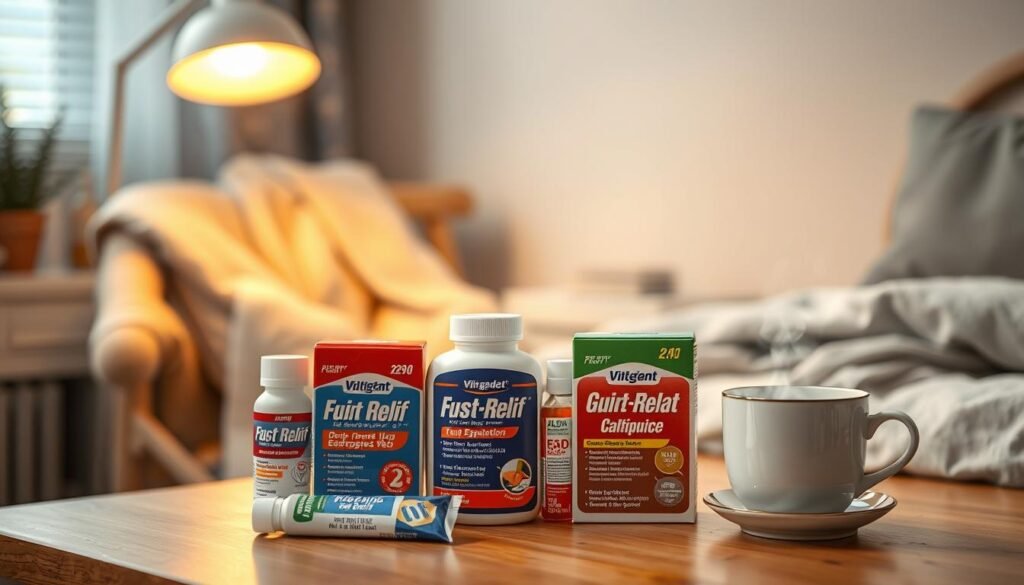Almost 40% of adults feel a sore throat yearly, mainly during the cold season. This issue often comes with fatigue and body aches, making us look for relief. Knowing what causes and how to treat it makes a big difference in recovery speed.
A sore throat might be from a virus or bacteria, like group A streptococcus. Antibiotics work on bacteria, not viruses. Simple home remedies, like warm teas and saltwater gargles, help a lot. It’s key to watch for worse signs, like ear pains or big glands. Getting better from a sore throat and other symptoms means caring for yourself and maybe getting doctor’s advice. For more on sore throats, check the Mayo Clinic guide.
Key Takeaways
- Most sore throats, or pharyngitis, happen in the cold months.
- Bacterial reasons can be strep throat, but antibiotics don’t help with viruses.
- Warm drinks, salt gargles, and some meds are common home fixes.
- See a doctor if body aches don’t go away after the virus.
- Look out for bad signs like very high fevers or breathing trouble.
- Talk to health experts if you get both body pain and a rash or bad swelling.
Understanding Sore Throat Symptoms
When you have a sore throat, you might feel pain or a scratchy feeling making it hard to swallow. You could also have a fever, headache, and sore muscles. Swollen lymph nodes are common too. Knowing the symptoms helps get the right treatment fast.
Kids between 3 and 15 often get sore throats, including strep throat. Being around smoke can make sore throats more likely. Allergies to things like pets or mold can also cause problems.
Germs spread easily in places where people are close, like schools. Health conditions that make your immune system weaker can make you more likely to get sick. Being stressed or tired can also make you more vulnerable.
The American Academy of Pediatrics says to see a doctor if a sore throat doesn’t get better with the first drink in the morning. If a sore throat is really bad or won’t go away, it might mean something more serious.
Sore throats usually get better in 3 to 10 days. Most times, viruses are to blame, but bacteria can cause them too. Antibiotics help with strep throat but not with viruses.
Knowing the difference is key to getting the right help. Quick action can make recovery easier and faster. For more info on sore throat diagnosis, check out this resource.
Common Causes of Sore Throat and Associated Symptoms
Sore throat often starts from viruses, like the common cold or flu. Other times, it’s from bacterial infections such as strep throat. Bacterial infections can be serious, causing high fever and swollen glands.
There are many reasons why people get sore throats. Here are some:
- Viral infections: The most common reason for throat discomfort.
- Bacterial infections: Group A streptococcus leading to strep throat.
- Fungal infections: Often linked to long-term steroid use or immunosuppression.
- Allergic reactions: Conditions like hay fever causing throat irritation.
- Dry air: Especially prevalent in indoor environments during winter.
- Gastroesophageal reflux disease: A condition where acid from the stomach irritates the throat.
- Muscle strain: Due to excessive voice use or shouting.
Symptoms can be different depending on the cause of the sore throat. Some symptoms people might have include:
- Pain or scratchiness in the throat.
- Difficulty swallowing and speaking.
- Fatigue and general malaise.
- Muscle aches and headaches.
- Fever, particularly with viral infections.
Knowing the causes and symptoms helps in figuring out the problem. This knowledge assists in making better choices for treatment. If symptoms persist or get worse, seeing a doctor is important for further help.
Identifying Viral Infections
Knowing about viral infections is key, as they often cause sore throats. Viruses like rhinoviruses and influenza lead to these. To identify a viral sore throat, recognize its symptoms and know what to do next.
Common Viruses Leading to Sore Throat
Some viruses are well-known for causing sore throats. These include:
- Rhinoviruses – They are the main cause of common colds.
- Influenza virus – It can suddenly make your throat sore along with fever and body aches.
- Epstein-Barr virus – This virus causes mononucleosis, showing throat pain and tiredness.
Knowing the differences among these viruses helps in spotting viral infections.
Symptoms of Viral Infections
Being familiar with the symptoms of viral throat infections is useful. It helps in caring for oneself and knowing when to see a doctor. Viral infections typically have symptoms like:
- Nasal congestion
- Cough
- Fatigue
- Body aches
- Throat pain in a specific area
Noticing these signs early helps in handling the infection. If symptoms get worse, it’s crucial to get medical help.
| Virus Type | Common Symptoms |
|---|---|
| Rhinovirus | Runny nose, sneezing, mild sore throat |
| Influenza | High fever, severe body aches, sudden throat pain |
| Epstein-Barr | Tiredness, swollen lymph nodes, ongoing sore throat |
Treating a Sore Throat with Fatigue and Body Aches
Dealing with a sore throat and fatigue is tough. Most times, a virus like the cold or flu is to blame. Alongside, you might feel worn out or have muscle pains, adding to the challenge.
Staying hydrated is key to easing that throat pain. Warm drinks can soothe the irritation. It’s also important to rest well to fight off the tiredness. Medicine like ibuprofen or acetaminophen helps with both throat discomfort and aches, improving your overall well-being.
It’s important to consult a doctor if you suspect strep throat. This condition can cause intense throat pain, fever, and nausea, especially in kids. Antibiotics are typically needed for treatment. After about 24 hours on antibiotics, patients usually aren’t contagious anymore.
Knowing whether your sore throat is caused by a virus or bacteria is vital. With the right care, you can ease the soreness and tackle the fatigue.

Home Remedies for Sore Throat Relief
Finding ways to ease a sore throat at home can be comforting. Using natural ingredients and simple steps can help soothe your throat. This brings relief to irritated areas.
Soothing Fluids and Foods
Eating the right foods is vital for sore throat recovery. Warm herbal teas, like chamomile, reduce inflammation and hydrate. Honey is also great for reducing pain and can be added to tea or taken alone.
Cold treats such as popsicles or ice cream can cool down throat irritation. Chicken noodle soup is a go-to for warmth and hydration. These foods help keep your throat moist and reduce discomfort.
Gargling Salt Water
Gargling with salt water is a proven remedy for throat pain. Mix 1 cup of warm water with a bit of salt and baking soda. This mixture cleans the throat and eases swelling and pain.
Gargling three to four times a day can give quick relief. Salt water is effective in fighting bacteria and soothing the throat. It’s a key remedy for sore throat care.
Over-the-Counter Solutions
Getting rid of a sore throat is simpler with the right OTC solutions. They target pain and provide comfort. It’s key to pick the best medications for your needs. Many options like pain relievers and throat soothers are out there.
Effective Pain Relievers
OTC pain relievers can lessen sore throat symptoms. Acetaminophen (Tylenol) and ibuprofen (Advil, Motrin) are great at reducing pain and swelling. Always follow the recommended doses. This is very important for kids’ safety. Talking to a doctor first offers extra confidence in your choice.
Throat Lozenges and Sprays
Throat lozenges and sprays provide quick comfort. They numb the throat briefly, easing swallowing and irritation. Lozenges with menthol or honey are quite soothing. Choose throat treatments with natural ingredients for better results. Remember, keep lozenges and sprays away from young kids to avoid choking risks.

Check out CVS for a wide range of OTC sore throat remedies. Their products are made to give relief and comfort during recovery. Always follow the medication instructions for the best outcome.
When to Seek Medical Attention
It is important to know when a sore throat needs a doctor’s care. Most sore throats are from viruses and get better alone, but some signs mean you should see a doctor. If your sore throat lasts a long time, has a high fever over 101°F, or you have swollen glands, it might be bacterial.
Signs of Bacterial Infection
Being aware of certain symptoms is key. If adults have trouble swallowing, feel pain in joints or ears:
- Difficulty swallowing or breathing
- Joint pain or earaches
- Rash or blood in saliva
- Hoarseness lasting over two weeks
You should think about getting advice from a doctor if you see these symptoms. Children with a high fever above 104°F or a sore throat that doesn’t go away need to see a doctor quickly.
Importance of Throat Swab Testing
To diagnose strep throat, a throat swab test is a must. This simple test checks for strep bacteria to see if antibiotics are needed. If the rapid test is negative but the doctor still thinks you might have strep, you may get a throat culture. Quick diagnosis and the right treatment can prevent other problems and help you heal faster.
Alternative Treatments and Natural Remedies
Many people look for relieve from sore throats with natural remedies. They explore herbal treatments, which are popular for their comforting effects. Herbs like slippery elm, licorice root, and marshmallow root are often taken as tea or lozenges. These natural methods can ease symptoms and make you feel better. However, it’s important to talk to a doctor before trying these remedies.

Herbal Remedies
Herbal remedies are praised for their throat pain relief abilities. Slippery elm has a substance that coats the throat and reduces irritation. Licorice root can calm inflammation, easing throat pain. Marshmallow root helps hydrate and shield sore throat lining. These herbs show how effective nature can be in easing throat discomfort along with usual treatments.
Potential Effectiveness of Alternative Treatments
It’s crucial to check if alternative treatments work. Some studies show herbs like echinacea can lessen cold symptoms. But, some products, like zinc sprays, can have bad side effects. This is why the FDA warns against them. Balancing natural and medical treatments is key to avoid missing out on necessary health care.
Understanding both herbal and other options helps make informed health decisions. For more details on natural treatments, consider visiting this guide for helpful tips.
Self-Care Tips for Relief
Self-care is key to soothing a sore throat. These strategies lower symptoms and help you heal faster. Rest, lots of liquids, and using a humidifier are big helps. They make your throat feel better and improve your health overall.
Rest and Hydration
Getting enough rest is crucial. Your body needs sleep to heal and fight germs. Being hydrated is just as important. Try to drink 64 ounces of fluids every day, like water, herbal tea, or broth. This helps soothe your throat and keeps you hydrated.
Avoid things that can make you dehydrated, like caffeine and alcohol. They can slow down your recovery.
Using a Humidifier
Using a humidifier helps a lot if you have a sore throat. It keeps the air moist, which reduces throat pain. Make sure to clean your humidifier to stop mold and bacteria from growing. This keeps the air safe to breathe.
You can also try home remedies like gargling warm salt water. This can provide extra relief for your throat.
Conclusion
This guide wraps up tips on treating sore throats. It’s key to know when to see a doctor. A sore throat can often be treated at home with simple methods. Gargling salt water, drinking plenty of fluids, and other remedies can help a lot.
Using echinacea or garlic might reduce cold symptoms too. It’s important to talk with doctors for the best results. They can help you understand how to manage a sore throat better. Plus, vitamin D and herbal supplements could help prevent sore throats or ease symptoms.
Most sore throats get better in about a week. This article showed how to care for yourself and heal faster. Remember, knowing what causes your sore throat is key. Using home treatments, over-the-counter aids, and getting doctor’s advice when needed is smart. This guide is here to help anyone with a sore throat recover more comfortably.